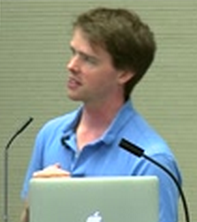CppCast Episode 18: POCO Project with Aleksandar Fabijanic
Episode 18 of CppCast the only podcast by C++ developers for C++ developers.In this episode Rob and Jason are joined by Aleksandar Fabijanic to discuss the C++ Portable Components project.
CppCast Episode 18: POCO Project with Aleksandar Fabijanic
by Rob Irving and Jason Turner
About the interviewee:
Alex holds two undergraduate degrees in mechanical engineering from Faculty of Engineering (University of Rijeka, Croatia) and the master's degree in software engineering from Citadel Graduate College in Charleston, South Carolina. Alex is a IEEE Computer Society Certified Software Development Professional. He's been seriously programming computers since 1992 and developing steel manufacturing automation and process control software using C and C++ since 1998. He used to compete in rowing on World Championship/Olympic Games level. Nowadays, he spends his free time reading, exercising and occasionally woodworking.

 Have you registered for CppCon 2015 in September? Don’t delay –
Have you registered for CppCon 2015 in September? Don’t delay –